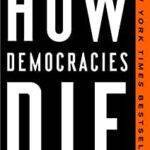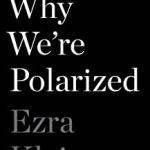Looking back through my lifetime (which is long), the Progressives of today are the age my grandchildren would be. And that’s using the traditional definition of “generation,” not social science’s current definition, which names a new generation every ten or twelve years. Indeed, the younger Progressives are the age of my “would-be” great-grandchildren. That tells me they have no experience with anything but a polarized nation.
Both Steven Levitsky/Ziblatt (How Democracies Die) and Ezra Klein (Why We Are Polarized) place the beginning of polarization in the  Sixties, with the campus war protests, civil rights movements, and the assassinations of 1968. My daughters, late Boomers, were caught in the chaos as school children. They experienced the disruption of
Sixties, with the campus war protests, civil rights movements, and the assassinations of 1968. My daughters, late Boomers, were caught in the chaos as school children. They experienced the disruption of the times but have little or no awareness of a time before—the “so-called” stable Fifties. I’ve argued that the split came earlier with McCarthyism, for I came of age being called “Unamerican,” and Levitsky names demonizing opponents as the earliest stage of democracy’s demise.
the times but have little or no awareness of a time before—the “so-called” stable Fifties. I’ve argued that the split came earlier with McCarthyism, for I came of age being called “Unamerican,” and Levitsky names demonizing opponents as the earliest stage of democracy’s demise.
In any case, for these adults, political action means protest and confrontation and viewing opponents as a threat to the social order. They’ve grown up viewing politics as corrupt, compromise as “giving in” at best, “selling out” at worst. Theirs is the rhetoric of war and they know no other. Therefore, they know nothing but a grid-locked government, which is the inevitable result of this brand of politics. For me, whose past was full of passionate political arguments, that is a great loss. How can we expect Congress to return to government by compromise if its members believe compromise is sullying their moral standards?
The nation answered that question by electing Biden, an old hand of my generation who still remembers something different. Unfortunately, the Progressives hold liberals who are moderate in great disdain. I find that disrespect demoralizing, for it shows how confrontational politics have transformed the civic moral code. Idealism, in my day, meant to believe in certain moral truths of fairness, equality, and justice and work toward them. They are goals. We understood that, for the most part, our opponents believed in the same goals, but differed in how to reach them. The politics of the last generations have transformed those goals into entitlements and see the opponents as denying their birthrights.
How did this come about? By living in a world that behaved that way and not being educated in anything different. The first is inevitable, the second not, but civic education has fallen beneath the wheels of individualism. Civics, even in my time, was a mere one-term, much-trivialized course in secondary school. In colleges and universities, the goal is individual careers. Courses in one’s major, therefore, have gobbled up the curriculum, leaving general education courses as leftovers of a previous generation, neither wanted or valued. Departments focus on attracting and educating graduate students in their specialty; educating the student population at large is left to teaching assistants. Nowhere does the student experience the kind of hours-long political arguments that consumed student cafes and dorm rooms in the past.
Back when we could talk politics as friends, for example, we used to make a distinction between romantic and pragmatic idealism. Romantics believe humans are good; it is the system that makes them bad. Pragmatics believe humans are primarily selfish, but the right system can make them better. Jefferson was of the romantic sort, as is Bernie Sanders—and Karl Marx. Madison, the Clintons, and Biden are of the second—and so am I. Such arguments about human nature and power never reached a conclusion, of course, but they engage students as participants in the process. They make you examine your assumptions; they make you think about the conditions of your existence. In the universities where I taught from 1979-2001, this wasn’t happening. Once, in fact, I heard a political science teaching assistant question whether to tell students that there was another theory (I don’t’ remember about what); the professor shook his head. “We don’t want to confuse them.”
That is unacceptable. As is not teaching students in elementary and secondary schools about slavery, or the history of civil rights. Not teaching them how to look at theory—any theory including “Critical Race Theory”—in college, defies any meaning of democracy yet invented. Conventionally held beliefs acquire the acceptance as “Truth” and come to be taught as such. Yes, it is a shock to suddenly have wrongdoing explode into view. I remember the shock of reading Morton Grodzins’ Americans Betrayed,* the story of the internment of Japanese-Americans during World War II. His revelations caused a nationwide uproar of shock and denial, but my boyfriend acted relieved. “Yes! That’s what happened!” he proclaimed. He had spent his teens in Hood River, Oregon, in the heart of Japanese-American fruit farms, and watched them being replaced by Caucasians during the war. Now it was explained—and public knowledge. Keeping such things secret only makes their evil grow.
Critical truths can be learned by such experiences. Not that they destroy all belief in human greatness, but that the system, the institutions, do not crumble at their exposure. Not that humans don’t do wrong, but that it can be exposed and fixed. To believe the system causes the problem, the romantic view, is, in my opinion, to be forever throwing systems out, and forever remaining in the same place—in revolution. The result is the kind of disillusionment young Progressives are expressing by destroying statues of Lincoln. It’s my fervent hope that these young activists learn from those who remember and still engage in the kind of debate they, and I, believe makes better systems—and better human beings.
*University of Chicago Press, 1969. Now out of print.



I really appreciate this article. Thank you!I think it should appear in The NY Times Opinion section.
Thank you, Teresa. I’m thinking of reworking some of my blogs into full essays, so thanks for the encouragement, also. And a huge CONGRATULATIONS to you for becoming a finalist in the Chanticleer contest–and in two categories, no less. Go girl!